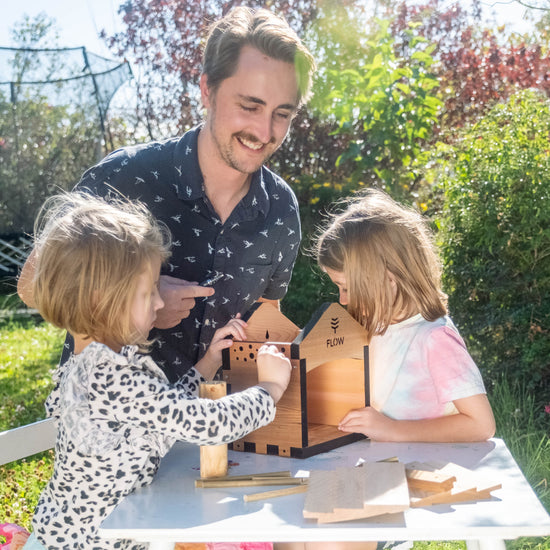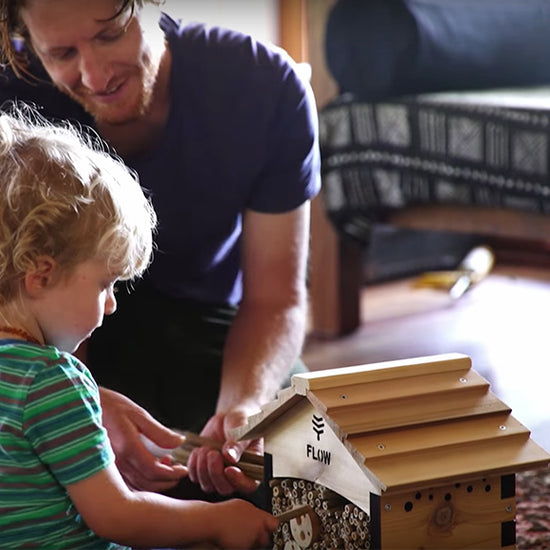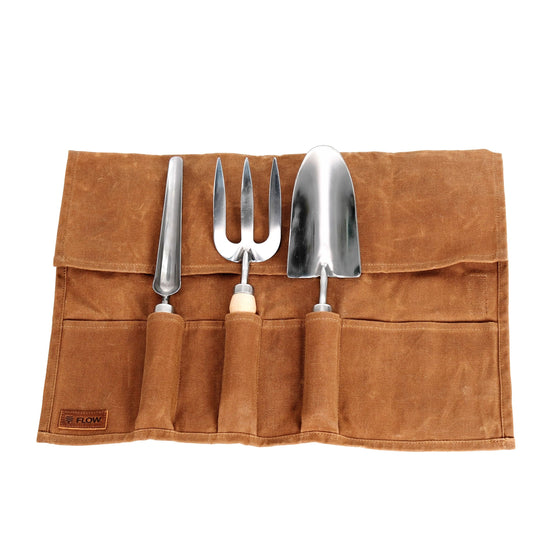Your Cart is Empty

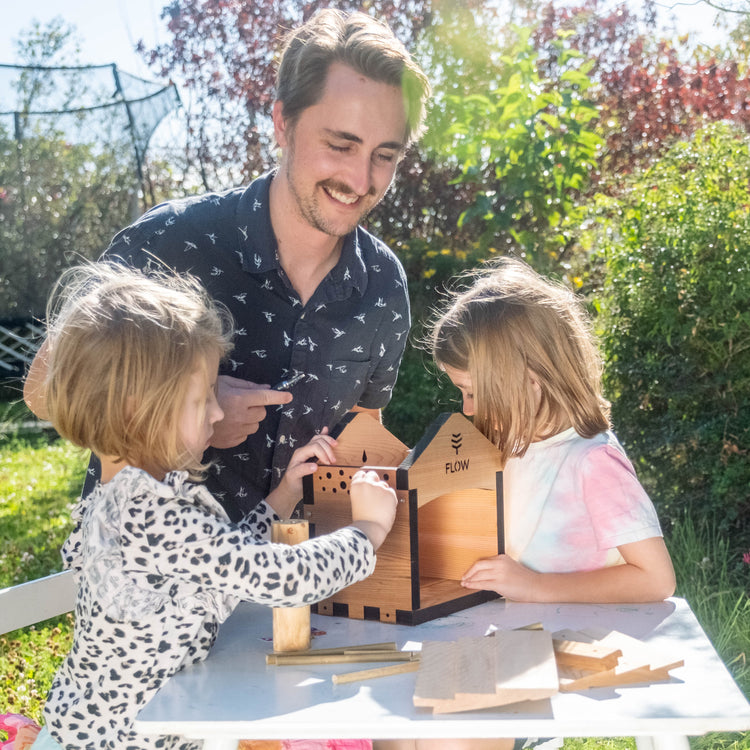
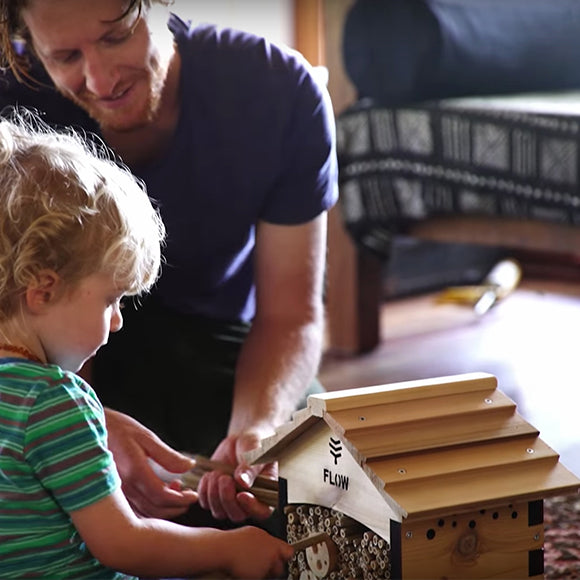
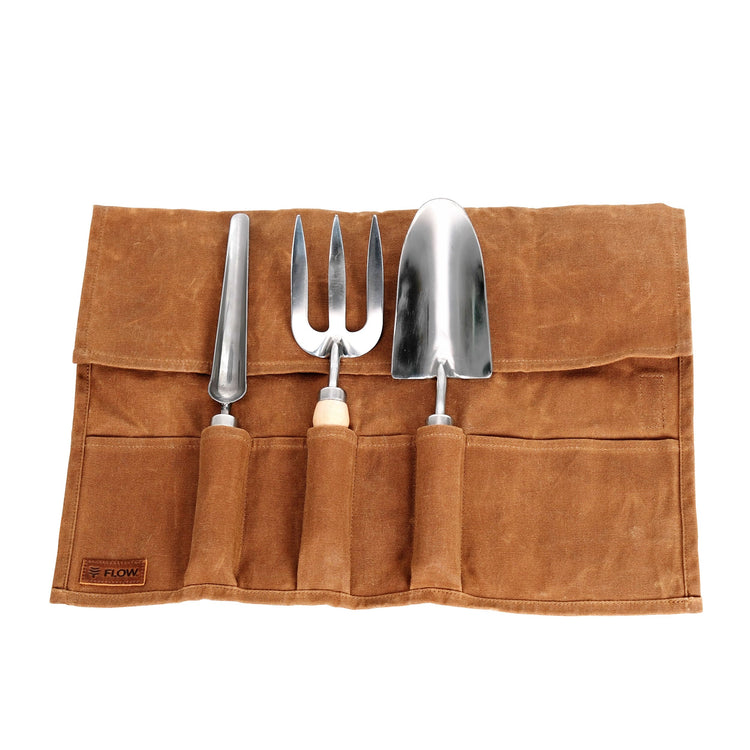




Pollinator's Bundle
Our Pollinator’s Bundle is the perfect gift for garden lovers or anyone who’d like to attract tiny garden allies to their yard.
Includes a Flow Pollinator House, Flow Garden Tools and your choice of book.
$158 - $188

Upcycled Western Red Cedar

Sustainably made in Australia
PRODUCT DESCRIPTION
Our Pollinator’s Bundle is the perfect gift for garden lovers or anyone who’d like to attract tiny garden allies to their yard. Includes your choice from our bee book library to learn more about the bees you can spot in your yard.
Your love of gardening isn’t just good for you, it’s good for the bees too. By planting flowers and building flourishing gardens, you’re supporting our tiny environmental champions by increasing pollinator habitat around your neighbourhood.
Help create beautiful garden forage for the bees with our premium Flow Garden Tools and provide a cosy home for solitary nesting bees with the Flow Pollinator House.
BUNDLE INCLUSIONS
1 x Flow Pollinator House
1 x Beekeeping book (choose 1 of 4)
- QueenSpotting
- The Book of Bees
- Bees of Australia book – A photographic exploration
- The Australian Beekeeping Manual
1 x Flow Garden Tool Set
- Flow Garden Trowel
- Flow Garden Widger
- Flow Garden Fork
- Flow Garden Tool Roll
CARE GUIDE
POLLINATOR HOUSE
All images are for illustrative purposes – actual product may vary slightly.
The Flow Pollinator House is made from salvaged timber hive panels which means each house will be unique.
Manufactured in upcycled sustainably sourced western red cedar – once assembled, oil or paint the house and make sure to apply two coats of good quality outdoor paint to the roof to provide longevity against the elements.
Find the assembly guide here.
Maintenance is required to ensure that the house is safe and habitable for solitary nesting visitors, which will differ depending on local conditions.
Bamboo inserts need to be monitored for pests and to reduce the risk of spreading diseases. It's good practice to replace these tubes every second year to limit the buildup of pathogens and fungus. Read more here.
GARDEN TOOLS
To best care for your garden tools, store them in a dry place out of the weather. If needed you can wash your garden tools in warm soapy water, rinse them clean and dry them thoroughly.
GARDEN TOOL ROLL
The waxed cotton tool roll is made from global organic textile standard (GOTS) cotton, features leather trims and has been wax-coated to provide a durable finish. Waxed cotton will develop a patina over time, resulting in a timeless vintage look.
If required, spot clean with a damp cloth. Hand soak with castile soap as needed. Do not machine wash or dry clean. Do not tumble dry. Do not iron. Store in a cool dry place, out of the weather and direct sunlight.
SAFETY
Solitary bees are generally harmless and non-aggressive. Some insects do sting, so it’s best to exercise caution when handling your pollinator house.
SHIPPING INFO
Dispatch times below:
Bees of Australia: Dispatches in 1-2 working daysQueenSpotting: Dispatches in 1-2 working days
Australian Beekeeping Manual: Sold Out
Book of Bees: Dispatches in 1-2 working days
Safe and sound
A cosy home for solitary nesting bees
Designed to house native solitary nesting bees and to help create pollinator corridors between our wild spaces for habitats affected by land clearing and urbanisation.
The Flow Pollinator House is created from salvaged Flow Hive 2+ timber offcuts and sustainably sourced bamboo, making each house unique.
The best news is, 100% of profits from this product are donated to support pollinator advocacy, protection and education.
The perfect gift for garden enthusiasts or passionate pollinator protectors.
Dig in style
Premium garden tools
Carefully crafted from FSC-certified beechwood and the highest quality stainless steel, these gardening tools are essential for every green thumb, and come wrapped in a durable GOTS-certified waxed cotton tool roll for safekeeping.
Includes a Flow Garden Trowel, Flow Garden Widger, Flow Garden Fork and Flow Garden Tool Roll for growing your pollinator habitats.
Choose the perfect book to add to your collection!

The Book of Bees
Author: Piotr Socha
Artist: Wojciech Grajkowski
A big, beautifully illustrated book on one of the most amazing animals on earth: the humble bee.
This beautiful book is filled to the brim with interesting facts and engaging illustrations that provide a deeper understanding of the wonderful world of bees. It’s perfect for kids from 10 and up (and adults will love it too!)

QueenSpotting
Author: Hilary Kearney
Popular urban beekeeper Hilary Kearney challenges nature lovers, science fans, and beekeepers alike to ‘spot the queen’ in 48 amazing fold-out photo puzzles, accompanied by stories of the dramatic life of the queen bee and stories of swarm-capturing adventures.
Perfect for beekeepers, or bee enthusiasts.

Bees of Australia: A Photographic Exploration
Author: James Dorey
Discover the beauty and diversity of Australia's native bees.
There are an estimated 2000 to 3000 bee species in Australia, Bees of Australia introduces some of our incredible native bees, many of which can be found in your own garden.
Don't be surprised if you find yourself looking closer at every flower that you pass in search of our wonderful native bees.

The Australian Beekeeping Manual
Second edition. Author: Robert Owen
An accessible, comprehensive reference for both novice and experienced beekeepers in Australia.
This book contains a wealth of knowledge for beekeepers of all levels – we love its practical tips and instructions on caring for bees, plus its interesting and informative chapters on the myriad ways that bees enrich our lives. A perfect accompaniment to TheBeekeeper.org!
Tiny environmental champions!
Bees are responsible for the pollination of 30 percent of the world's crops and up to 90 percent of our wild plants.
There are over 19,000 different species of bees worldwide, the majority of which are solitary nesters and their numbers are on the decline.
Supporting pollinators
Not all species nest in a pollinator house like this. There are plenty of other ways you can help support solitary nesters, such as making holes in mud for the blue-banded bee, or drilling holes in wood. You can go to town creating pollinator zones in your garden. Find some great tips for creating your own pollinator house here.
Important notes
- Shipped flat-packed for easy assembly.
- Roof requires painting to protect against the weather.
- Your bamboo inserts come in myriad shapes and sizes. Have some fun assembling them in your own unique way!
- Does not include bees.
- Does not include our patented Flow Frame technology.
- This hive is exclusively for the habitat of native solitary nesting bees, not for harvesting honey.
Your questions answered
-
The Flow Pollinator House provides space for and encourages differing pollinator species to take up residence in your garden.
Unlike European honey bees, the majority of bee species worldwide are actually solitary nesters who require and seek out a cosy home to nest in.
Different types of pollinators require different types of homes. Cavity-nesting bees use hollow plant stems or holes in wood for laying their eggs. These solitary bees do not have queens or workers, nor do they store any honey in their tiny nests. In addition to nesting, some species like to hibernate over winter and are on the lookout for sheltered spaces with plant matter as insulation.
Our Flow Pollinator House aims to replicate these ideal nesting conditions for the dual purpose of supporting these incredible insects whilst your garden reaps the rewards of their residence.
Not all species nest in a pollinator house like this. There are plenty of other ways you can help support solitary nesters, such as making holes in mud for the blue-banded bee, or drilling holes in wood. You can go to town creating pollinator zones in your garden. Find some great tips for creating your own pollinator house here.
-
Finding an area which is bathed in gentle sunlight (which solitary bees love) and is protected from prevailing winds, tall weeds and other animals is ideal. Optimally the house should be facing between the north and east in the Southern Hemisphere, and between south and west in the Northern Hemisphere, in a position which doesn’t get too hot, and is 1 metre off the ground but no higher than 2 metres.
Add your own unique home renovations such as dried leaves, grass or crumpled cardboard to the roof of your Flow Pollinator House to further diversify its appeal to different species. Selecting a position which is already attracting insects, either a garden bed with flowers, a pond or an area with some trees will help to encourage vacancies in your pollinator house to fill up quickly.
Don’t forget to provide access to plenty of forage and water for your pollinators.
-
Our Flow Pollinator House was developed out of a desire to find a way to repurpose our Flow Hive offcuts and unused wooden panels, whilst at the same time creating a habitat for these important little pollinators.
Crafted from western red cedar, the Pollinator House has been manufactured using precision laser cutting from salvaging timber panels and offcuts from the production of our Flow Hive 2+.
Don't be surprised if you find a handle or Flow logo on the timber panels – we love the uniqueness this adds to each individual house.
Bamboo inserts have been sustainably sourced, making for deluxe pollinator suites.
-
There is so much we can do to support pollinators! Here are some great tips for creating a bee-friendly garden mindfully:
Avoid pesticides. Companion planting is the way to go if you want to control pests. Pesticides are one of the reasons bee populations are in decline.
If you have room, plant flowering plants in bountiful clumps so bees don’t have to search far for forage and can work more efficiently.
Plant several species to ensure you have forage for every season.
Maintain multiple water sources around your garden.
Spread the word among your neighbours, family and friends, the more people you can encourage to look after your neighbourhood the greater your impact will be collectively.
Check out our Bee-Friendly Gardening fact sheet for more information about gardening mindfully for pollinators.


